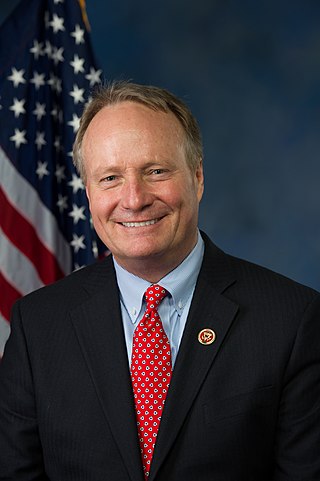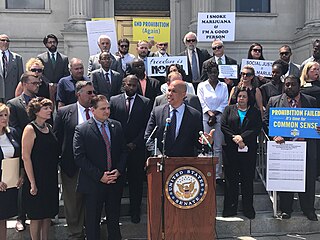
The prohibition of drugs through sumptuary legislation or religious law is a common means of attempting to prevent the recreational use of certain intoxicating substances.

The Marijuana Policy Project (MPP) is the largest organization working solely on marijuana policy reform in the United States in terms of its budget, number of members, and staff.

In the United States, the removal of cannabis from Schedule I of the Controlled Substances Act is a proposed legal and administrative change in cannabis-related law at the federal level. It has been proposed repeatedly since 1972. The category is the most tightly restricted category reserved for drugs that have "no currently accepted medical use."

In the United States, the non-medical use of cannabis is legalized in 24 states and decriminalized in 7 states, as of November 2023. Decriminalization refers to a policy of reduced penalties for cannabis offenses, typically involving a civil penalty for possessing small amounts, instead of criminal prosecution or the threat of arrest. In jurisdictions without penalty the policy is referred to as legalization, although the term decriminalization is sometimes used for this purpose as well.

Jared Schutz Polis is an American politician, businessman, and philanthropist serving as the 43rd governor of Colorado since 2019.

In the United States, increased restrictions and labeling of cannabis as a poison began in many states from 1906 onward, and outright prohibitions began in the 1920s. By the mid-1930s cannabis was regulated as a drug in every state, including 35 states that adopted the Uniform State Narcotic Drug Act. The first national regulation was the Marihuana Tax Act of 1937.

Drug liberalization is a drug policy process of decriminalizing or legalizing the use or sale of prohibited drugs. Variations of drug liberalization include drug legalization, drug relegalization, and drug decriminalization. Proponents of drug liberalization may favor a regulatory regime for the production, marketing, and distribution of some or all currently illegal drugs in a manner analogous to that for alcohol, caffeine and tobacco.

The use, sale, and possession of cannabis containing over 0.3% THC by dry weight in the United States, despite laws in many states permitting it under various circumstances, is illegal under federal law. As a Schedule I drug under the federal Controlled Substances Act (CSA) of 1970, cannabis containing over 0.3% THC by dry weight is considered to have "no accepted medical use" and a high potential for abuse and physical or psychological dependence. Cannabis use is illegal for any reason, with the exception of FDA-approved research programs. However, individual states have enacted legislation permitting exemptions for various uses, including medical, industrial, and recreational use.

In the United States, the use of cannabis for medical purposes is legal in 38 states, four out of five permanently inhabited U.S. territories, and the District of Columbia, as of March 2023. Ten other states have more restrictive laws limiting THC content, for the purpose of allowing access to products that are rich in cannabidiol (CBD), a non-psychoactive component of cannabis. There is significant variation in medical cannabis laws from state to state, including how it is produced and distributed, how it can be consumed, and what medical conditions it can be used for.

David Patrick Joyce is an American politician and attorney currently serving in the United States House of Representatives for Ohio's 14th congressional district since 2013. A member of the Republican Party, Joyce was previously the prosecutor of Geauga County, Ohio. He chairs the Republican Governance Group.

The Cannabis Act (C-45) of June, 2018 paved the way for the legalization of cannabis in Canada on 17 October 2018. Police and prosecution services in all Canadian jurisdictions are currently capable of pursuing criminal charges for cannabis marketing without a licence issued by Health Canada. The Supreme Court of Canada has held that the federal Parliament has the power to criminalize the possession of cannabis and that doing so does not infringe upon the Canadian Charter of Rights and Freedoms. The Ontario Court of Appeal and the Superior Court of Ontario have, however, held that the absence of a statutory provision for medical marijuana is unconstitutional, and to that extent the federal law is of no force and/or effect if a prescription is obtained. The recreational use of cannabis has been legalized by the federal government, and took effect on 17 October 2018.
House Resolution 1227, "Ending Federal Marijuana Prohibition Act of 2017", is a U.S. United States House resolution introduced during the 115th Congress. It would remove cannabis from the Controlled Substances Act Schedule I, and eliminate Federal restrictions on cannabis possession and sale, other than interstate transfers. It was initially sponsored by Thomas Garrett Jr., a Virginia Republican, and cosponsored by Scott Taylor, also a Virginia Republican, and Tulsi Gabbard, a Hawaii Democrat. It is reintroduced legislation from 2015, when it was known as S. 2237. Other Representatives who joined as cosponsors included Justin Amash, a Michigan Republican. On April 20, 2017, activists from D.C. Cannabis Campaign distributed 1,227 joints made from 1 pound (0.45 kg) of cannabis to members of congress to urge consideration of the bill.
The Strengthening the Tenth Amendment Through Entrusting States (STATES) Act was a bill proposed in the 115th United States Congress that would recognize legalization of cannabis and the U.S. state laws that have legalized it through their legislatures or citizen initiative. It was introduced on June 7, 2018, by Senators Cory Gardner and Elizabeth Warren. A companion bill was introduced the same day in the House of Representatives, sponsored by Earl Blumenauer and David Joyce. The act would amend the Controlled Substances Act of 1970 to exempt from federal enforcement individuals or corporations in states who are in compliance with U.S. state, U.S. territory and the District of Columbia, or tribal law on cannabis, with certain additional provisions such as minimum ages. The banking provisions of the STATES Act have been reintroduced as the Secure and Fair Enforcement (SAFE) Banking Act of 2019 in the 116th U.S. Congress by Ed Perlmutter in the House, and by Jeff Merkley in the Senate. As of September 18, 2019, the House bill had 206 cosponsors, and the Senate bill had 33 cosponsors.
Cannabis legislation proposals are legislative proposals which failed to make it into law. Below are lists, broken down into national jurisdictions, of proposed legislation regarding cannabis.

The Marijuana Opportunity Reinvestment and Expungement Act, also known as the MORE Act, is a proposed piece of U.S. federal legislation that would deschedule cannabis from the Controlled Substances Act and enact various criminal and social justice reforms related to cannabis, including the expungement of prior convictions.

The Marijuana Justice Act (S.1689) was a 2017 bill to remove cannabis from the Controlled Substances Act, sponsored by U.S. Senator Cory Booker. An identical bill, H.R.4815, was introduced in the House of Representatives. The bill was reintroduced in 2019 and co-sponsored by a number of contenders for the Democratic Party's nomination for U.S. President in the 2020 election, including Kamala Harris, Elizabeth Warren, Kirsten Gillibrand, Michael Bennet, and Bernie Sanders. In February 2019, it was referred to the Committee on the Judiciary. The bill introduced by Senator Booker in the 2017–2018 Congress was called "among the most notable efforts" around legalization in that session. Besides removing cannabis from the Controlled Substances Act, the bill also sought to set up a community reinvestment fund, provide for expungement of past drug convictions, and penalize states that enforce cannabis laws disproportionately.

The Cannabis Administration and Opportunity Act is a proposed bill in the United States Congress to recognize legalization of cannabis by the states. The authors are Senate Majority Leader Chuck Schumer, Senator Cory Booker, and Senator Ron Wyden.

The Medical Marijuana and Cannabidiol Research Expansion Act is an Act of Congress allowing medical research on cannabis. The act is "the first standalone marijuana-related bill approved by both chambers of the United States Congress".










